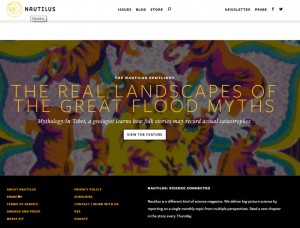 The article we read from the Alaskan First Nations perspective was among my favourites. This topic is deeply interesting to me, as I originally started in Science and lost interest in persuing it too deeply because I saw how many gaps specialization created. Scientists really need to be systems thinkers in this day and age. Recently, however, I noticed that there are trends trying to tie together concepts in a more holistic fashion.
The article we read from the Alaskan First Nations perspective was among my favourites. This topic is deeply interesting to me, as I originally started in Science and lost interest in persuing it too deeply because I saw how many gaps specialization created. Scientists really need to be systems thinkers in this day and age. Recently, however, I noticed that there are trends trying to tie together concepts in a more holistic fashion.
I took a screen shot of the above Posting from Nautilus, a science online periodical, and was heartened to see that not only did I capture a message about what Nautilus’ mission is, but that the article was very much related to the material we covered in this course.

